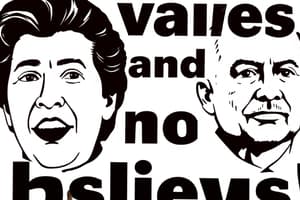Podcast
Questions and Answers
Values are a special kind of affective expressions of belief that endures and our responses to events, circumstances or people.
Values are a special kind of affective expressions of belief that endures and our responses to events, circumstances or people.
True (A)
The term 'propaganda' has maintained its neutral connotation throughout history.
The term 'propaganda' has maintained its neutral connotation throughout history.
False (B)
The Institute for Propaganda Analysis (IPA) was established in 1973 to study propaganda techniques.
The Institute for Propaganda Analysis (IPA) was established in 1973 to study propaganda techniques.
False (B)
Spin, news management, and public relations are used to emphasize the negative in a story.
Spin, news management, and public relations are used to emphasize the negative in a story.
Jowett and O'Denviell defined propaganda as a random attempt to shape perceptions and direct behavior for the benefit of the public.
Jowett and O'Denviell defined propaganda as a random attempt to shape perceptions and direct behavior for the benefit of the public.
The bandwagon technique aims to convince people to join a group by suggesting they'll be overlooked if they don't.
The bandwagon technique aims to convince people to join a group by suggesting they'll be overlooked if they don't.
Card stacking involves presenting a balanced argument, including both pros and cons.
Card stacking involves presenting a balanced argument, including both pros and cons.
Glittering generalities use very specific language to clearly convey their message.
Glittering generalities use very specific language to clearly convey their message.
The transfer technique associates the authority or credibility of a person with a message.
The transfer technique associates the authority or credibility of a person with a message.
Plain folks strategy involves convincing people that someone is upper class and unrelatable to them.
Plain folks strategy involves convincing people that someone is upper class and unrelatable to them.
Testimonial involves using a recognized expert to endorse a product or idea.
Testimonial involves using a recognized expert to endorse a product or idea.
Name calling is a technique using positive words to create a favorable opinion about a certain group.
Name calling is a technique using positive words to create a favorable opinion about a certain group.
Apparatus theory proposes that cinema is inherently neutral and depicts reality objectively.
Apparatus theory proposes that cinema is inherently neutral and depicts reality objectively.
Using the image of a national flag in a product advertisement is an example of 'plain folks'
Using the image of a national flag in a product advertisement is an example of 'plain folks'
A politician saying "I will lead this country out of the light" is an example of glittering generalities.
A politician saying "I will lead this country out of the light" is an example of glittering generalities.
Flashcards
Values
Values
Values are principles that we use to judge the worth of an idea or practice. They guide our decisions and actions, defining what we consider right or wrong, desirable or undesirable.
Propaganda
Propaganda
Propaganda is a deliberate, systematic attempt to influence people's perceptions, beliefs, and behavior to achieve a specific agenda.
Spin
Spin
Spin refers to the presentation of information in a biased way, often to highlight positive aspects while downplaying negative ones. It's a form of communication used to control how people perceive a situation.
Public Relations
Public Relations
Signup and view all the flashcards
Seven Propaganda Devices
Seven Propaganda Devices
Signup and view all the flashcards
Transfer
Transfer
Signup and view all the flashcards
Name Calling
Name Calling
Signup and view all the flashcards
Card Stacking
Card Stacking
Signup and view all the flashcards
Bandwagon
Bandwagon
Signup and view all the flashcards
Testimonial
Testimonial
Signup and view all the flashcards
Glittering Generalities
Glittering Generalities
Signup and view all the flashcards
Plain Folks
Plain Folks
Signup and view all the flashcards
Apparatus Theory of Media
Apparatus Theory of Media
Signup and view all the flashcards
Ideology in Media
Ideology in Media
Signup and view all the flashcards
Study Notes
Values and Attitudes
- Values are a special kind of belief, enduring and unlikely to change.
- Attitudes are emotional expressions of beliefs and responses to events.
- Values influence behavior, acting as a predisposition (tendency) to react positively or negatively to situations, events, or people.
- Values are principles used to judge the worth of ideas or practices.
- Values provide the criteria for judgment.
- Spiritual values guide actions and decisions related to a higher power.
Propaganda
- Propaganda is the dissemination or promotion of particular ideas, often to advance religion or justify conquest.
- The term "propaganda" has roots in Latin ("to propagate" or "to sow"), having been used throughout history.
- The Vatican established a "Sacre Congregatio de Propaganda Fide" in 1672 to promote the Catholic Church.
- Propaganda aims to persuade people to think and behave in a desired way, often through manipulating information.
- Propaganda strategies include creating positive imagery, minimizing negative information, and manipulating messages to evoke emotions.
- The Institute for Propaganda Analysis (IPA) in the U.S. (1937) analyzed propaganda techniques and materials.
Propaganda Devices
- Bandwagon: Encourages people to join a movement or action by implying that everyone else is already participating.
- Card Stacking: A biased presentation of arguments where contradictory information is omitted or ignored.
- Glittering Generalities: Uses appealing words or ideas to inspire feelings of patriotism or goodwill but avoids giving specific details.
- Transfer: Shifts the authority of a respected person or entity to someone or something else.
- Testimonial: Uses endorsements from prominent figures to promote ideas, products, or opinions.
- Plain Folks: Appealing to a common audience by relating to them through common values and experiences.
- Name-Calling: Associates an idea, person, or group with negative labels to negatively impact judgment.
Media and Ideology
- Ideology is a system of ideas.
- In media, ideology can shape how events are reported and understood.
- Antoine Destutt de Tracy, a French aristocrat, is credited with founding the term "ideology".
- The term is derived from Greek words meaning "form, pattern and -logos", often referring to discourse.
Media Organizations and Stakeholders
- The market model of media operates using supply and demand.
- The ideal scenario is a balance between supply and demand, creating equilibrium.
Lifestyles
- Lifestyles are the ways people live, including interests, behaviors, and opinions.
- Lifestyles are determined by tangible elements (social class, income, status) and intangible elements (values, attitudes).
- Mass advertising often attempts to encourage purchases based on specific lifestyles.
Studying That Suits You
Use AI to generate personalized quizzes and flashcards to suit your learning preferences.




